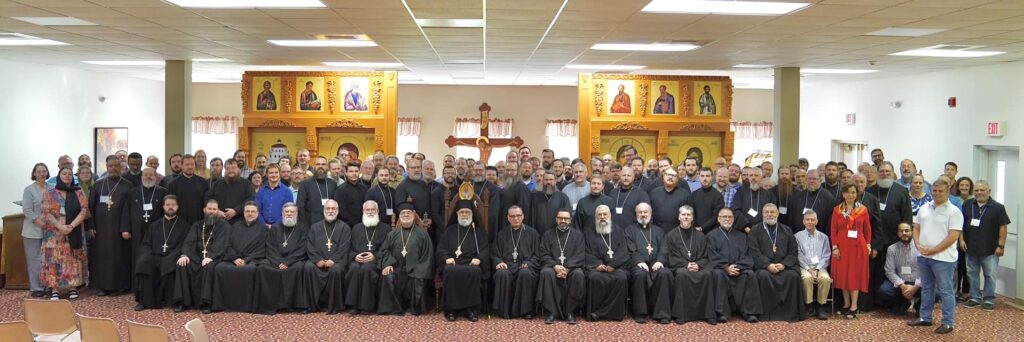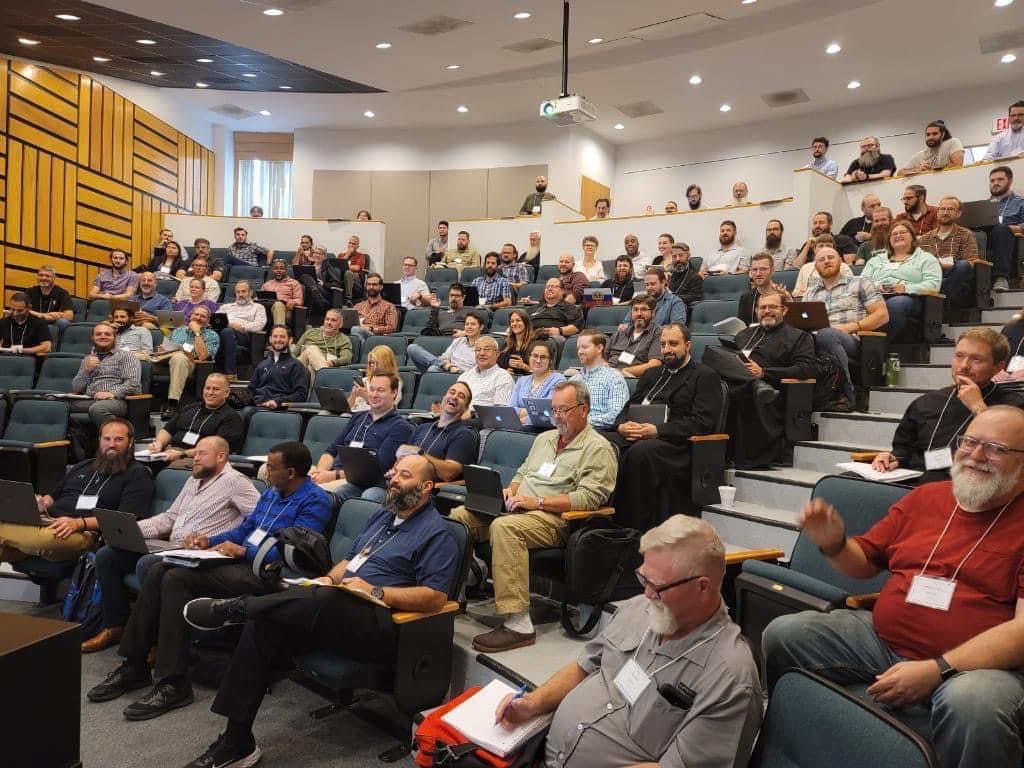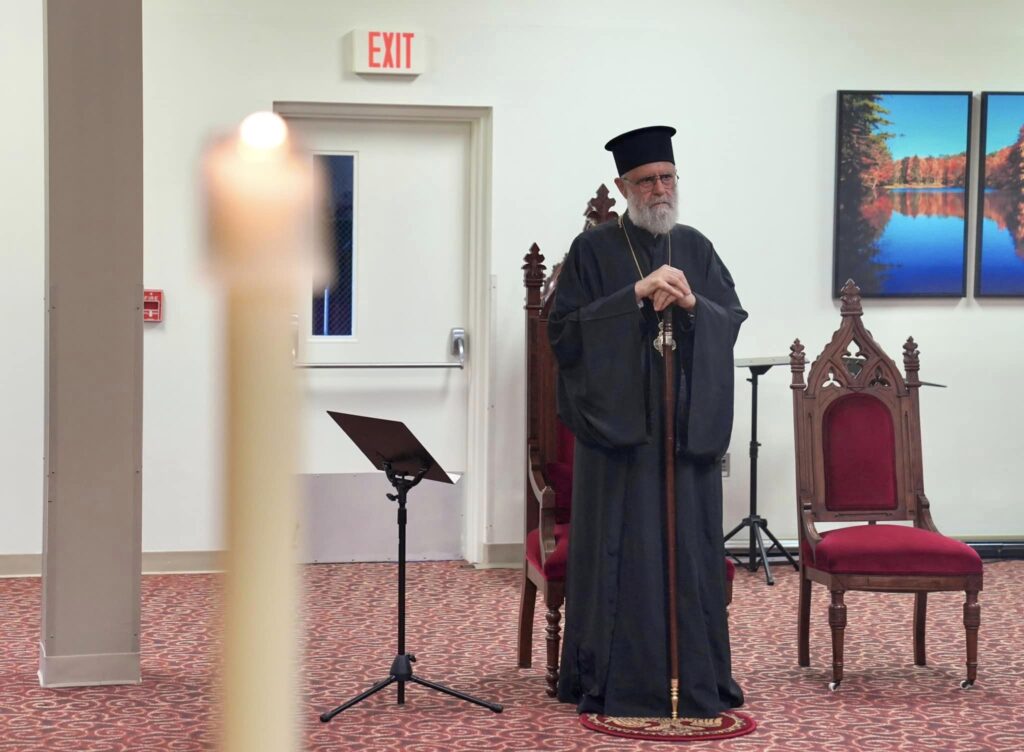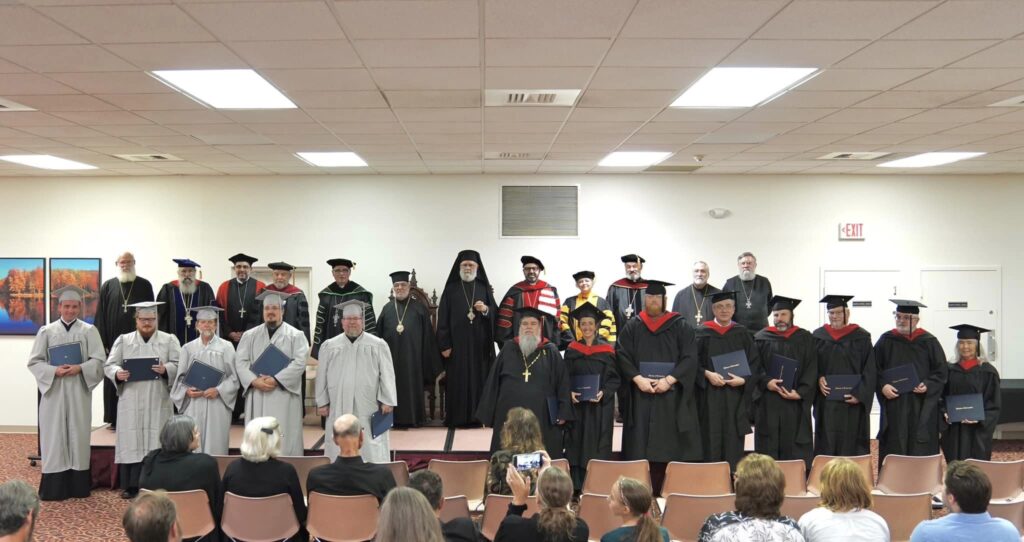On May 24th, 2025, the Orthodox Academic Society (OAS), in partnership with the Antiochian House of Studies (AHOS), held its 7th Biannual Summer Symposium under the theme “The Legacy of the First Ecumenical Council at Nicaea.” Gathering via Zoom, the event brought together faculty, clergy, and graduate students for a powerful day of theological reflection, spiritual edification, and scholarly fellowship.
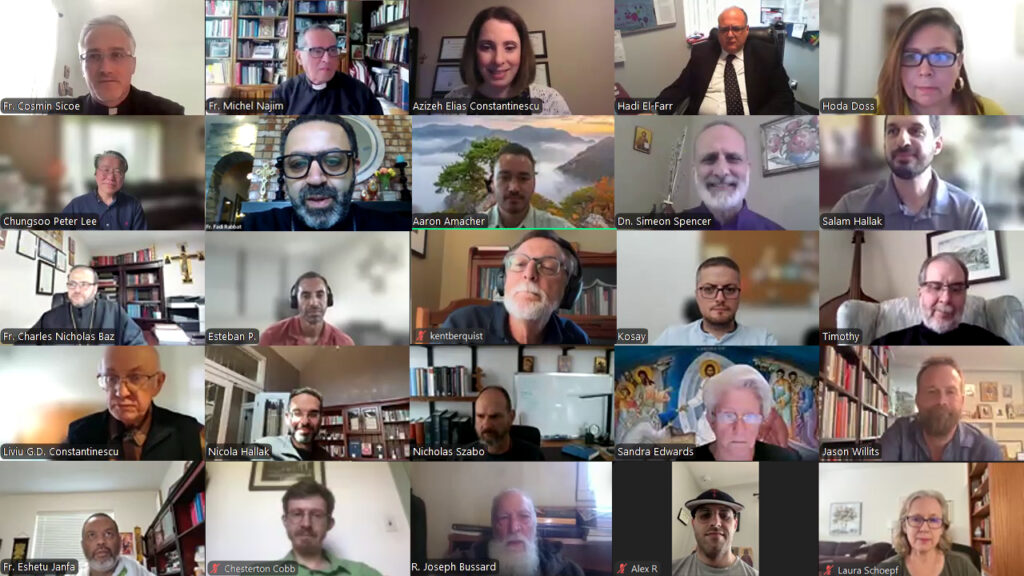
A Spirit-Filled Opening: Welcoming Words from Church Leaders
The symposium opened with a welcome by Deacon Simeon Spencer, OAS Coordinator, followed by an opening prayer led by Rt. Rev. Fr. Fadi Rabbat, Dean of AHOS.
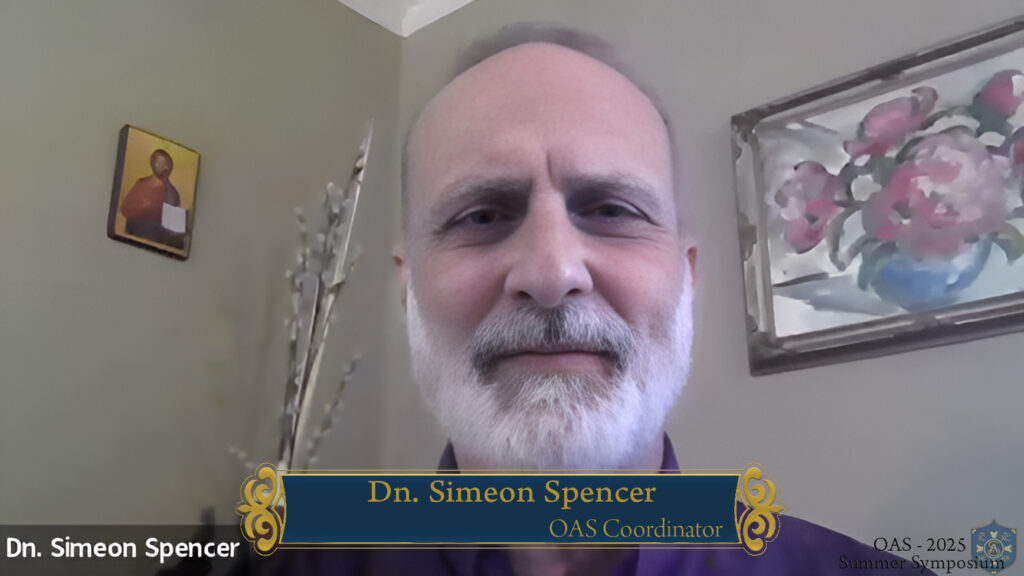
V. Rev. Fr. Michel Najim, President of AHOS, opened the symposium with a reflection that set the tone for the day a powerful call to Orthodox graduate students and students to see themselves not merely as academic participants, but as spiritual stewards of the Church’s living tradition.
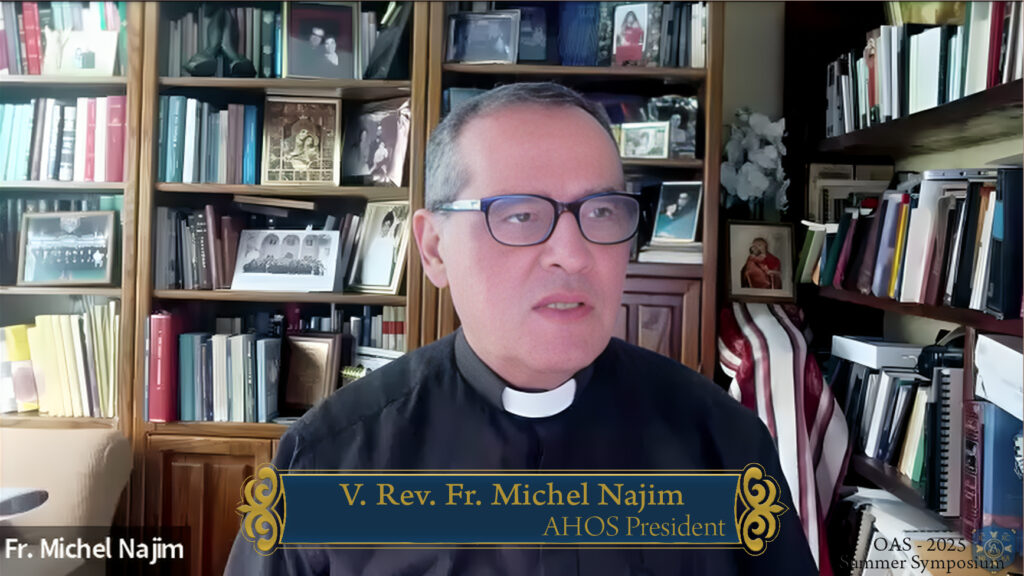
He welcomed participants on behalf of the Metropolitan Saba and AHOS leadership, extending gratitude to all participants and affirming the symposium as a shared witness to the apostolic faith affirmed at Nicaea, and emphasizing that the gathering was more than a meeting of minds it was a moment of shared responsibility for the theological heritage of the Church. Drawing on his recent travels to theological symposiums in Greece and Romania, Fr. Michel spoke of a growing sense of urgency for collaboration among Orthodox institutions worldwide.
“These encounters deepened my conviction that collaboration among Orthodox theological institutions is not only desirable—it is imperative,” he said.
He eloquently described the Holy Spirit as the architect of the Church’s intellectual and spiritual unity, echoing the Council of Nicaea’s witness to the one faith. Fr. Michel challenged the attendees to cultivate their charisms—not in isolation—but in communion with the Church and one another. He offered a beautiful image of theological study not as the pursuit of mere knowledge, but as a transformative journey:
“Your task is not only to acquire knowledge of the faith but to live it and transmit it faithfully… Theological institutions transcend geographical and cultural boundaries to bear witness to the one faith delivered to the saints.”
His exhortation ended with a stirring reminder: to neglect one’s vocation as a theological scholar is to quench the Spirit. Instead, he called all present to embrace their calling with reverence, courage, and humility. The Spirit-filled tone of his message became a touchstone for the rest of the symposium.
Rt. Rev. Fr. Fadi Rabbat, Dean of AHOS, focused entirely on the spiritual and ecclesial legacy of the First Ecumenical Council at Nicaea (325 AD)—the defining theme of the symposium. He reminded listeners that Nicaea was not just a historical council but a divine moment, inspired by the Holy Spirit to preserve the truth of Christ’s nature against Arian heresy.
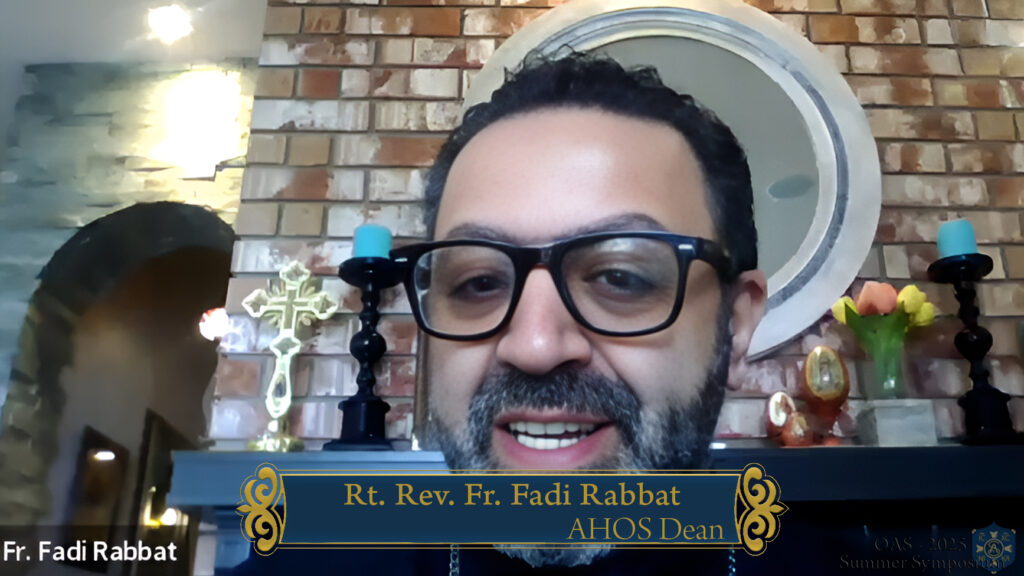
He highlighted how the Nicene Creed, formulated in that council, remains the Church’s enduring confession, affirming the full divinity of Christ: “God from God, Light from Light, true God from true God.”
“If Christ is not truly God, then our salvation is empty,” he warned, stressing the theological stakes of the Nicene confession.
Fr. Fadi interwove patristic wisdom from Saint Athanasius, Saint Basil the Great, and Saint John of Damascus, explaining how their voices defended and expanded the truths proclaimed at Nicaea. He showed that the authority of Ecumenical Councils, established at Nicaea, became the structural heart of Orthodox ecclesiology—a sacred method for preserving truth through conciliar discernment.
With pastoral warmth, he encouraged attendees to consider how each Orthodox Christian today is called to live the Faith of Nicaea, not merely study it. He called the faithful to safeguard that faith in their lives, homes, parishes, and studies:
“The importance of Nicaea is not confined to the past; it is a living testament to divine guidance.”
This speech served as both theological formation and spiritual call to action, drawing together the timeless truths of the Creed with the living witness of those who defend it today.
Academic Presentations: Orthodox Wisdom Across Disciplines
The core of the symposium featured four deeply engaging presentations from AHOS graduate students, each exploring different dimensions of Orthodox theology, history, and applied practice:
1- Whose Kingdom Shall Have No End: The Fallacy of Marcellus of Ancyra
By Fr. Charles Nicholas Baz, Ph.D. Candidate, AHOS
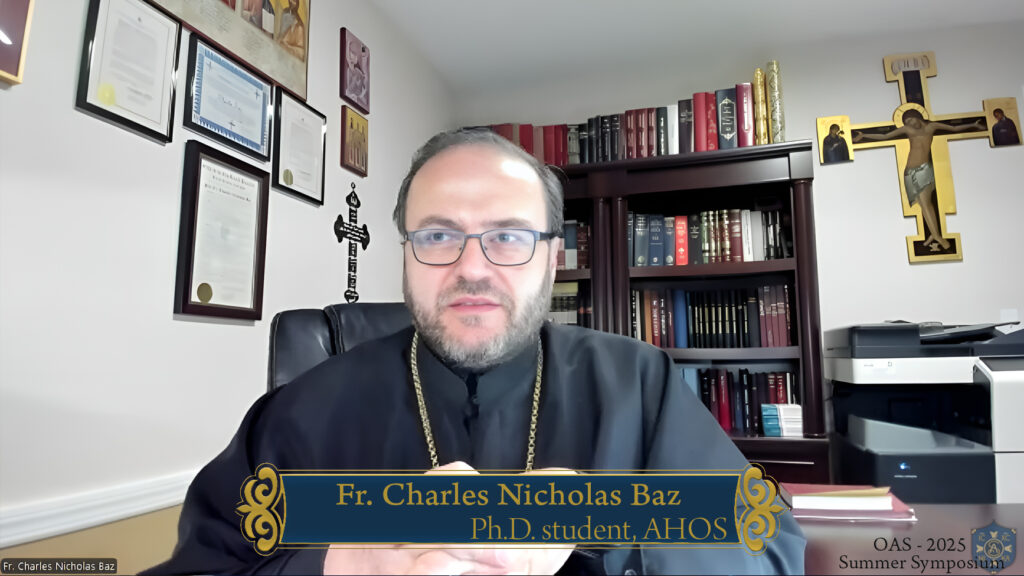
In a masterful and historically grounded presentation, Fr. Charles Nicholas Baz guided the symposium audience through one of the lesser-known yet pivotal controversies in the aftermath of the First Ecumenical Council. His paper, titled “Whose Kingdom Shall Have No End: The Fallacy of Marcellus of Ancyra,” illuminated how theological zeal, when untethered from ecclesial tradition, can lead even well-intentioned defenders of Orthodoxy into error.
Fr. Baz contextualized the fierce debates that followed the Council of Nicaea. While the council had affirmed the homoousios—the full divinity of Christ—the term itself, unfamiliar in Scripture, became a lightning rod for controversy. Amid the theological turmoil, several key defenders of Nicene orthodoxy emerged, including Athanasius of Alexandria, Eustathius of Antioch, and Marcellus of Ancyra.
Yet, as Fr. Baz explained, Marcellus’s anti-Arian passion veered into problematic territory. Using Neopythagorean geometry to describe the Trinity, Marcellus developed what Fr. Baz called a “contractionist model” of the Godhead—wherein the Logos and Holy Spirit were viewed as temporary extensions of the one God who would eventually “contract” back into oneness. This modalistic tendency echoed the condemned heresy of Sabellianism and undermined the permanent distinction of persons within the Trinity.
Fr. Baz showed that while Marcellus was opposing the Arians, he ultimately introduced a different distortion: one that risked dissolving the eternal reign of Christ. This prompted the Church to add the phrase “Whose kingdom shall have no end” at the Second Ecumenical Council, directly refuting Marcellus’s eschatological errors.
His paper served as a stark reminder: orthodoxy is not simply a matter of opposing heresy—it also requires fidelity to the living tradition of the Church. As Fr. Baz eloquently concluded, “Speculative theology, divorced from apostolic witness, often leads to ruin, even when pursued with sincere intentions.”
2- Widows in the Canonical Orthodox Tradition
By Dr. Hoda Doss Gerges, MTh in Pastoral Care and Counseling, AHOS
With a blend of scholarly rigor and pastoral sensitivity, Dr. Hoda Doss Gerges offered a moving presentation on “Widows in the Canonical Orthodox Tradition.” Her research spotlighted how the Orthodox Church’s canon law—far from being a rigid legal system—is a living pastoral tradition rooted in the Gospel and shaped by the Holy Spirit.
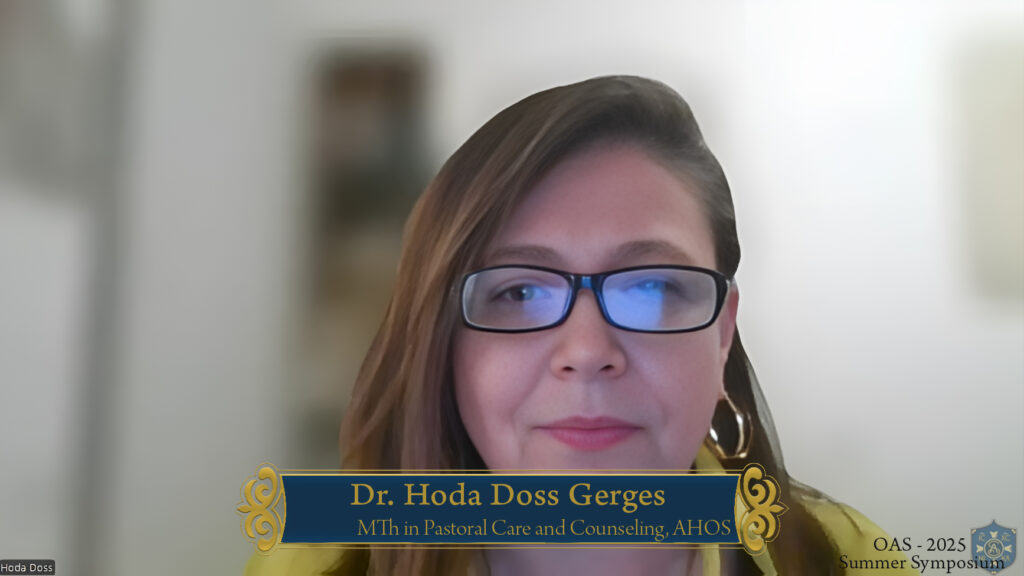
Dr. Gerges explained that canon law emerged not in abstraction, but as a response to pastoral needs, with widows often at the heart of these concerns. Drawing on the canons of multiple ecumenical and local councils, including the Holy Sixth Ecumenical Council and the teachings of Saint Basil the Great, she showed how the early Church sought to protect and guide widows with both dignity and discernment.
She introduced the concept of economia—the Church’s pastoral flexibility in applying canonical norms—noting that love and mercy, not mere legality, must guide the interpretation of the sacred canons. “A fixed code is not the foundation of canon law,” she asserted. “Rather, it is a tradition rooted in the incarnational life of Christ and in the pastoral care of the Church.”
Importantly, she emphasized that widowhood is not merely a social or emotional category, but a spiritual state. Christian celibacy, she explained, is a conscious vocation—whether chosen from youth or entered into through loss. Widows who live in fidelity, purity, and service are icons of consecrated life.
Through this exploration, Dr. Gerges brought forward a compassionate ecclesiology that blends truth and grace. Her work invites the Church to reexamine how it accompanies widows—not merely through policies or structures—but through a pastoral theology steeped in love, prayer, and spiritual wisdom.
3- Faith in Action: Diligence and Almsgiving for God’s Glory, Spiritual Growth, and the Path to Salvation
By Dr. Hadi El-Farr, Master of Theological Studies
In a passionate and practical presentation, Dr. Hadi El-Farr tackled a subject rarely addressed so directly in Orthodox contexts: wealth, labor, and almsgiving as pathways to salvation. His paper, titled “Faith in Action: Diligence and Almsgiving for God’s Glory, Spiritual Growth, and the Path to Salvation,” proposed a robust Orthodox theology of stewardship that is as economically grounded as it is spiritually rich.
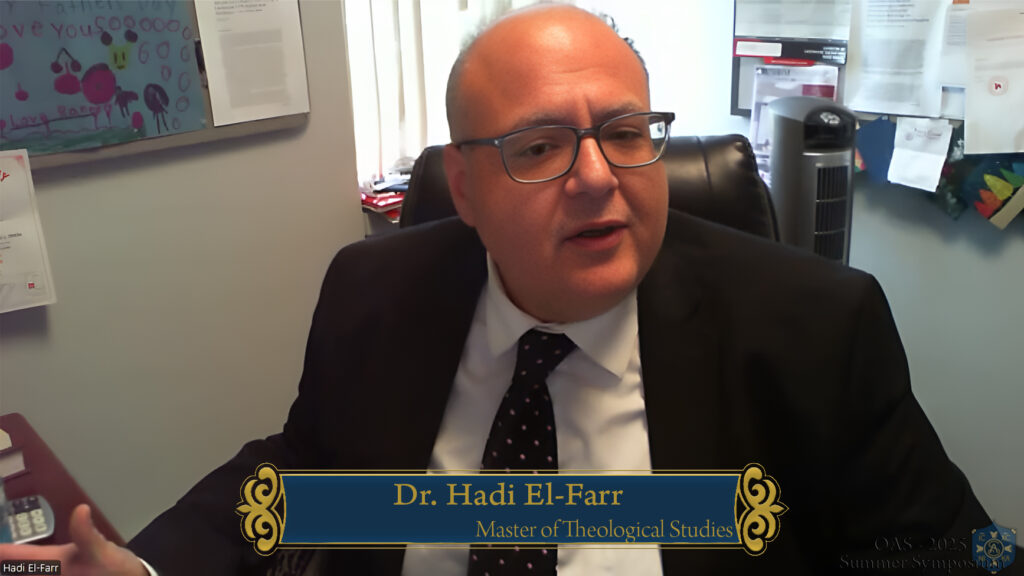
Drawing from Scripture, patristic teachings, and Church tradition, Dr. El-Farr dismantled the false dichotomy between faith and work. He reminded the audience that the Bible speaks more about material possessions than many other spiritual topics—yet Christians often shy away from engaging with economic life as a sphere of spiritual discipline.
“Wealth is not inherently sinful,” he asserted. “But it demands spiritual maturity and intentional management.”
He outlined four pillars of Orthodox stewardship: diligent labor, just compensation, wise management of wealth, and sacrificial almsgiving. Each of these, he argued, is a concrete manifestation of one’s spiritual health. He emphasized that laziness is not a neutral failure but a sin with deep social and spiritual consequences, citing St. Paul’s admonition: “If anyone will not work, neither shall he eat.”
Perhaps most strikingly, Dr. El-Farr underscored almsgiving as a path to theosis—not simply as a charitable act, but as a form of divine justice and transformation. He echoed the words of St. Gregory of Nazianzus and St. Basil the Great, who taught that wealth hoarded at the expense of the poor is not only selfish—it is spiritually dangerous.
“Almsgiving is not optional,” he said. “It is a sacred duty—an invitation to participate in the mercy of God Himself.”
4- The Application of Pastoral Care in Business through Servant Leadership
By Azizeh Elias Constantinescu, MTh in Pastoral Care and Counseling
In a groundbreaking contribution to the symposium, Azizeh Elias Constantinescu presented a synthesis of Orthodox pastoral theology and contemporary leadership practice in her paper, “The Application of Pastoral Care in Business through Servant Leadership.”
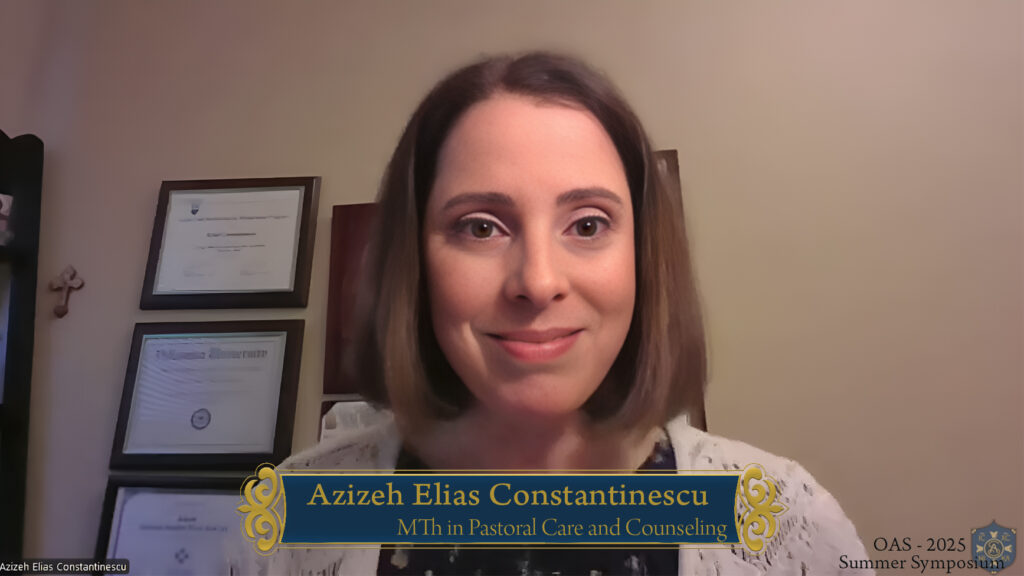
Drawing from her 2022 thesis at AHOS, she proposed that true servant leadership is not a management technique—but an ascetical vocation, rooted in the spiritual anthropology of the Orthodox Church. Her presentation bridged psychology, theology, and organizational behavior, showing how spiritual principles such as humility, prayer, and kenosis can transform corporate culture from within.
Central to her vision is the concept of psychological safety—the capacity for individuals within organizations to feel safe, heard, and valued. However, as she argued, safety is not achieved by flattening hierarchies, but by redeeming them through love, witness, and sacrificial service.
“Psychological safety occurs when the Logos is present in organizational life,” she stated.
Azizeh referenced Jean-Claude Larchet, St. Sophrony, and Metropolitan John Zizioulas to anchor her theological anthropology. She described a workplace where Orthodox leaders, by cultivating interior stillness and love, make room for communion rather than control.
Her conclusion was not just visionary but practical: Orthodox Christians in leadership roles have the power—and responsibility—to transform business into a space of healing, growth, and holiness. As she beautifully put it, “The servant leader casts out fear. Through love, he brings the Holy Spirit into the boardroom.”
Living the Faith of Nicaea in Today’s World
From Trinitarian theology to workplace relationships, from the defense of doctrine to the dignity of the widow, the 2025 Summer Symposium of the Orthodox Academic Society embodied a singular truth: Orthodox theology is not merely studied—it is lived.
Each speaker illuminated a different facet of this living faith, rooted in the legacy of the Council of Nicaea and flowering anew in every generation. As the Church continues to face modern challenges—both pastoral and cultural—these reflections serve as a guiding light, reminding us that faith, rightly lived, transforms the world.
The Orthodox Academic Society also extends heartfelt thanks to Peter Chungsoo Lee and Fr. Cosmin Sicoe for their tireless work in preparing and supporting the symposium. The event concluded with a prayer offered by Fr. Cosmin, bringing the gathering to a close in a spirit of unity and thanksgiving.


